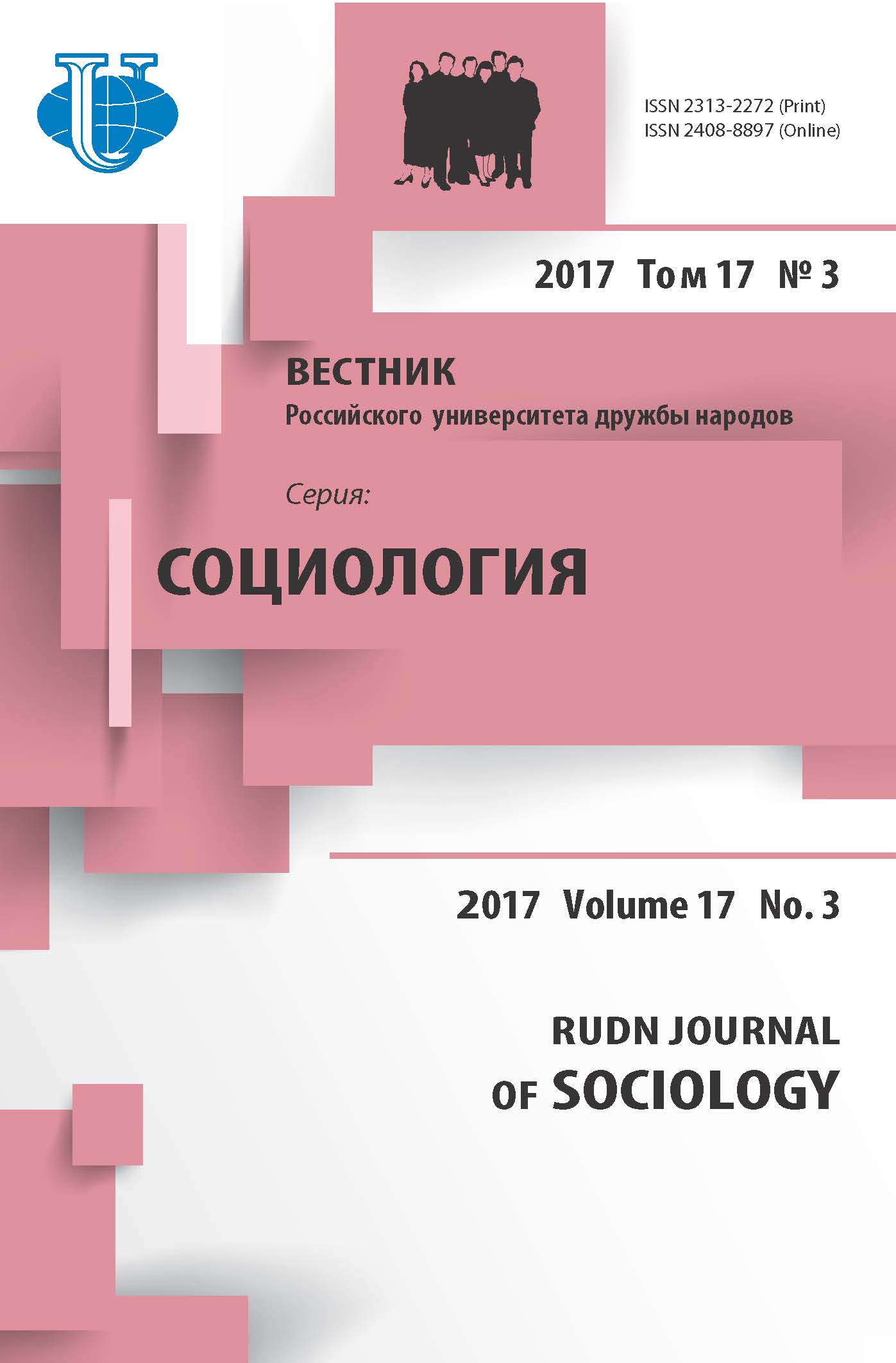CULTURAL IDENTITY AND ADAPTATION OF ETHNIC MIGRANTS IN RUSSIA
- Authors: Britvina IB1, Shumilova PA1
-
Affiliations:
- Ural Federal University
- Issue: Vol 17, No 3 (2017)
- Pages: 317-326
- Section: Surveys, experiments, case studies
- URL: https://journals.rudn.ru/sociology/article/view/16804
- DOI: https://doi.org/10.22363/2313-2272-2017-17-3-317-326
Cite item
Full Text
Abstract
The article presents the results of interviews with residents of Yekaterinburg (N = 485) and ethnic migrants from Central Asia (N = 231), which reveal the current forms of interaction between the host society and migrants from different countries, and the problem of mutual rejection that determines the growth of social conflicts. The authors identify key barriers hindering the mutual adaptation of the host society and migrants that are based on cultural differences and, thus, require a careful work with cultural identity as a determinant of interethnic interaction. However, the theoretical analysis proves the lack of a clear unambiguous interpretation of the ‘cultural identity’ concept that is necessary for the analysis of contem-porary social processes under the international migrations and intercultural communications. The article aims to prove the importance of both considering ‘cultural identity’ as a special analytical category and developing the common cultural identity in the process of mutual adaptation and integration of the Rus-sians and ethnic migrants. The authors use the constructivist approach and define ‘identity’ as a result of the identification process and a flexible element that can be changed according to the social situation. Thus, cultural patterns should become the basis of interethnic relations to ensure social well-being and stability, and cultural identity is to be the most important social construct to reduce social tensions de-termined by ethnic migrations. The development of a common social identity consists of several stages: first the common civil identity is to be formed, then the common cultural identity of the host society and ethnic migrants.
About the authors
I B Britvina
Ural Federal University
Author for correspondence.
Email: irinabritvina@yandex.ru
Mira St., 19, Yekaterinburg, 620002, Russia
P A Shumilova
Ural Federal University
Email: Polina_shumilova@mail.ru
Mira St., 19, Yekaterinburg, 620002, Russia
References
- Anderson B. Voobrazhaemye soobshhestva. Razmyshlenija ob istokah i rasprostranenii nacionalizma [Imagined Communities: Reflections on the Origin and Spread of Nationalism]. Moscow: KANON-press-C: Kuchkovo pole; 2001 (In Russ).
- Bourdieu P. Sociologija social'nogo prostranstva [Sociology of Social Space]. Moscow—Saint-Petersburg: Institut eksperimental'noj sociologii; Aleteya; 2007 (In Russ).
- Gumilev L.N. Etnogenez i biosfera zemli [Ethnogenesis and the Biosphere of Earth]. Saint-Petersburg: Kristall; 2001 (In Russ).
- Drobizheva L.M. Grazhdanskaya identichnost’ kak uslovie oslableniya etnicheskogo negativizma [National identity as a means of reducing ethnic negativism]. Mir Rossii. 2017; 26(1) (In Russ).
- Fromm E. Imet' ili byt' [To Have or to Be?]. Moscow: AST; 2000 (In Russ).
- Fromm E. Chelovek dlya samogo sebya [Man for Himself]. Moscow: AST; 2010 (In Russ).
- Erikson E. Detstvo i obshhestvo [Childhood and Society]. Saint-Petersburg: Lenato, AST, Uni¬versitetskaya kniga; 1996 (In Russ).
- Yadov V.A. Social’nye i social’no-psihologicheskie mekhanizmy formirovaniya social’noj iden¬tichnosti lichnosti [Social and social-psychological mechanisms for forming social identity]. Mir Rossii. 1995; 3—4 (In Russ).
- Brubaker R., Cooper F. Beyond “identity”. Theory and Society. 2000; 29(1).
- Goffman E. Stigma: Notes on the Management of Spoiled Identity. N.J.: Prentice-Hall; 1963.
- Schröder Ph., Stephan-Emmrich M. The institutionalization of mobility: Well-being and social hierarchies in Central Asian translocal livelihoods. Mobilities. 2016; 11(3).














